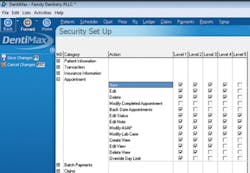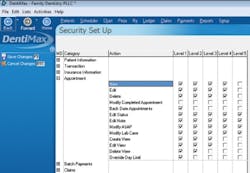No one is totally immune from theft, embezzlement
by Kent W. Stapley, DMD
For more on this topic, go to www.dentaleconomics.com and search using the following key words: embezzlement, theft, suspicion, audit report, software, access, Dr. Kent Stapley.
When it comes to theft and embezzlement, no one is totally immune. Susan Gunn, a national speaker and certified fraud examiner, told embezzlement course attendees at the 2011 Chicago Midwinter Meeting that three out of five professional practices are being embezzled. After the meeting, Gunn stated that approximately 80% of course attendees either suspect embezzlement in their practices or they recently had been victims of embezzlement.
“Simply stated,” Gunn said, “we are in a crisis.” If you ever suspect that something is not quite right with your office finances, there is a good chance that you are right.
Several years ago, I became suspicious of an office manager who worked in one of my satellite offices. The office’s collections were way down and I was concerned. After reviewing the software’s appointment book, it appeared that the office manager was undercollecting for my associate’s work.
I noticed that completed procedures that appeared on the appointments were, in some instances, missing from the ledger. This was especially true for the “cash” patients. I then pulled my associate dentist’s progress notes and verified my suspicion.
There was a huge discrepancy between the work my associate had recorded in his progress notes, and the work the office manager had recorded in the ledger. I next printed an audit report that informed me that my office manager was also deleting cash payments and then reentering these payments at lower amounts.
Hoping that she would make a voluntary confession, I asked why she had failed to enter certain procedures and why she had deleted cash payments from the software. She then surprised me by providing a very detailed and lengthy explanation, addressing all of my questions. I wanted to believe her, but I could not ignore the information the software provided. So I called the patient and informed her we were auditing our books. The patient then confirmed my suspicions.
Obviously, the first line of defense against embezzlement is to hire honest people. But beyond reviewing work history and calling references, no one can guarantee that their staff will never steal from them.
Bluntly stated, without good software, you cannot properly protect yourself from employee theft. I would not have pursued my suspicion and caught this office manager without the detailed information provided by my software program. I shudder to think about the amount of money that she could have stolen had I not caught her in the early stages.
My office uses DentiMax but Dentrix, Eaglesoft, SoftDent, and other software systems also have the ability to set up customized security and provide the reports needed to monitor staff. This type of function allows you to define the areas of the software your staff members have access to, and to what degree they get this access.
If you do not want your front desk personnel to delete ledger items without your consent, such as cash payments, limit access rights to the ledger. You could set up the ledger so your front desk staff can add and edit items but not delete items.
You should also be able to print an audit report for each employee. This report will tell you what your employees have deleted or added to your software. For example, you might run an audit report by your office manager’s name to see if cash payments have been deleted.
During the Cold War, Ronald Reagan quoted an old Russian maxim to Mikhail Gorbachev: “Trust but verify.”
Do the best you can in hiring trustworthy employees, but use your software’s capabilities to verify their honesty. By routinely verifying that employees are honest, your trust and appreciation for them will increase. But, perchance you find something wrong, you can take immediate corrective action before a problem has a chance to balloon or continues unabated.
For the past 15 years, Kent W. Stapley, DMD, has practiced general dentistry in Mesa, Ariz. Dr. Stapley owns and works from one dental office. But at one time, he owned four practices. His practices have used various software programs, including Softdent, Dentrix, and DentiMax. Contact him at [email protected].

